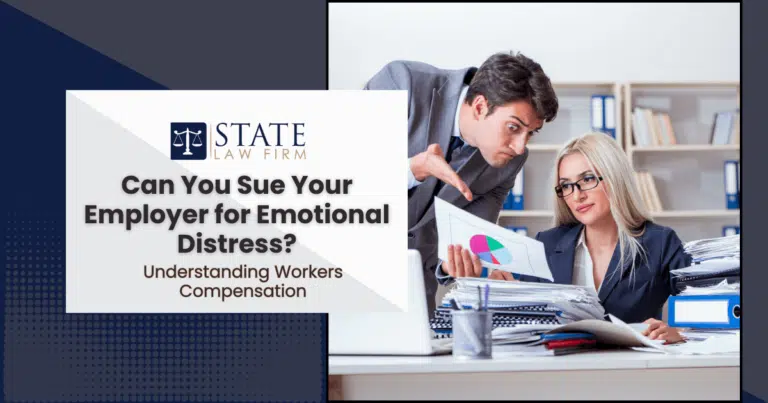Navigating emotional distress caused by workplace challenges can be complex, especially when considering legal options for relief. Recent studies show that nearly 83% of U.S. workers report feeling stressed at work, and more than half say it impacts their mental health significantly. For those facing severe emotional distress due to workplace conditions, understanding the intersection of emotional well-being and workers’ compensation is essential. (source).
In this article, we explore the legal grounds and distinctions between workers’ compensation and personal injury claims related to emotional distress. Can you sue your employer directly for emotional distress, or are there specific criteria that must be met? We delve into the factors that influence such cases, including documentation requirements, the role of negligence, and the potential challenges employees might face. Our guide aims to provide clarity while also reflecting our commitment as a boutique personal injury law firm, driven by young attorneys dedicated to helping clients through even the most challenging cases.
For more on workplace-related claims, our Sherman Oaks premises liability team is always ready to provide support. Learn more here.
The Intersection of Emotional Distress and Workers Compensation
Emotional distress in the workplace can stem from various factors, including hostile environments, excessive workloads, or witnessing traumatic events. Many employees find themselves unsure of their rights when it comes to mental and emotional well-being at work. Understanding how workers’ compensation interacts with emotional distress claims is crucial, as these cases require a different approach from physical injuries.
While worker’s compensation is primarily designed to address physical injuries, it may also apply to mental health cases under specific circumstances. If your mental well-being has been compromised due to workplace conditions, knowing your options can empower you to take the next step. Our firm is here to help individuals explore their rights and advocate for them through these challenging situations.
Pro Tip: Many states recognize psychological injuries as compensable under workers’ compensation, but they often require significant documentation and evidence of work-related causes. Working with knowledgeable attorneys early in the process can significantly impact your case’s outcome.
The Legal Grounds for Suing Your Employer for Emotional Distress
When considering an emotional distress lawsuit against your employer, it’s essential to understand the legal grounds. Emotional distress claims generally fall into two categories:
- Negligent Infliction of Emotional Distress (NIED): If an employer’s lack of reasonable care directly results in severe emotional distress, you may have grounds for a claim.
- Intentional Infliction of Emotional Distress (IIED): When an employer’s actions are outrageous or intentional, leading to emotional harm, you could file a claim for intentional infliction.
Both claims require meeting specific legal criteria to be successful. For NIED, you must demonstrate that the employer’s negligence directly caused your emotional distress. For IIED, you must prove that the employer’s behavior was extreme and outrageous, going beyond what is typically acceptable in the workplace. Each case is unique, and proving these claims can be challenging without experienced legal representation.
Pro Tip: Documentation is key in these cases. Keep a record of all incidents, communications, and witnesses, as this evidence can strengthen your case and support your claim for emotional distress.
Workers Compensation vs. Personal Injury Claims: What’s the Difference?
Emotional distress claims in the workplace can follow two paths: workers’ compensation claims and personal injury lawsuits. It’s essential to know the difference:
- Workers Compensation: Generally covers workplace-related injuries, including certain cases of emotional distress. It provides benefits but usually limits the ability to sue your employer directly.
- Personal Injury Claims: Unlike worker’s compensation, a personal injury claim may allow you to seek damages for emotional distress caused by intentional or negligent actions by your employer.
For many employees, filing a worker’s compensation claim for emotional distress may be the first course of action. However, there may be cases where a personal injury claim is more suitable. Understanding which path is right for you can save time, reduce frustration, and improve your chances of a favorable outcome.
If you’re unsure of the best route to take, consulting with our team can help clarify the options available for your unique situation. We’re dedicated to guiding clients through these challenging decisions with compassion and expertise.
When Can You File an Emotional Distress Claim Under Workers Compensation Laws?
Not all emotional distress cases qualify for workers’ compensation. However, there are specific situations where psychological injuries are covered:
- Exposure to traumatic events: Employees who witness or experience trauma may be eligible for emotional distress claims.
- Harassment or workplace bullying: Prolonged exposure to hostile environments or harassment may lead to eligible claims.
- Extreme job stress: If your role involves excessive stress that’s beyond the typical job scope, you may be able to file a claim.
Workers’ compensation laws vary by state, and it’s important to understand the legal requirements for emotional distress claims in your jurisdiction. Filing procedures can be complex, and deadlines are often strict. Having an attorney to guide you through this process can ensure you meet all necessary criteria.
Pro Tip: Every state has specific rules about what qualifies as a psychological injury under workers’ compensation. Check your state’s guidelines, and consider reaching out for legal advice to navigate these regulations effectively.
The Role of Documentation in Proving Emotional Distress Cases
Documentation is vital in proving emotional distress. Unlike physical injuries, emotional and psychological damage can be challenging to demonstrate without solid evidence. Here’s what you should gather:
- Medical records: Document visits to mental health professionals, diagnoses, and treatments.
- Workplace incidents: Keep detailed records of incidents that led to distress, including dates, descriptions, and any witness information.
- Written communications: Emails, texts, or written documents that support your claim can be crucial evidence.
Effective documentation demonstrates both the cause and impact of emotional distress, supporting your claim. Partnering with a lawyer can help you ensure that your records are comprehensive and correctly presented.
Potential Challenges When Suing Your Employer for Emotional Distress
Suing for emotional distress in the workplace comes with its own set of challenges. Common hurdles include:
- Proving emotional distress: Unlike physical injuries, psychological harm requires detailed evidence, which can be challenging to collect.
- Employer defenses: Employers may argue that emotional distress isn’t directly work-related or that they took appropriate measures to mitigate the issue.
- Mental health stigma: Unfortunately, some judges or juries may hold biases against mental health claims, making it difficult to get fair consideration.
- Legal requirements: States vary in what they allow under workers’ compensation for emotional distress, and proving psychological harm can be challenging without professional legal assistance.
If you’re facing these challenges, having a dedicated legal team by your side can make a significant difference. At our firm, we are passionate about helping individuals navigate these complex cases with support and professionalism, striving for the best possible outcome.
Taking legal action for emotional distress caused by workplace issues can feel daunting, but you don’t have to go through it alone. If you believe you have a claim, our team is here to help you understand your rights and options. Reach out to State Law Firm to discuss your case and take the first step toward protecting your mental well-being in the workplace.


